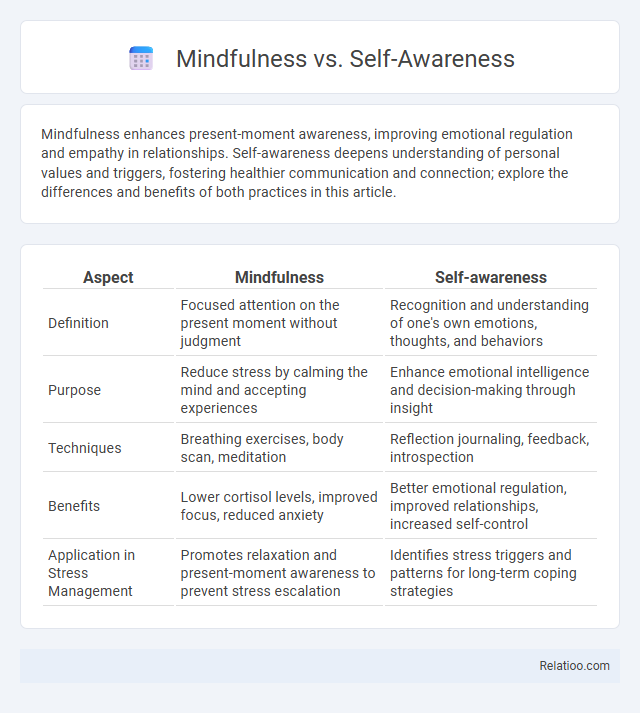Mindfulness enhances present-moment awareness, improving emotional regulation and empathy in relationships. Self-awareness deepens understanding of personal values and triggers, fostering healthier communication and connection; explore the differences and benefits of both practices in this article.
Table of Comparison
| Aspect | Mindfulness | Self-awareness |
|---|---|---|
| Definition | Focused attention on the present moment without judgment | Recognition and understanding of one's own emotions, thoughts, and behaviors |
| Purpose | Reduce stress by calming the mind and accepting experiences | Enhance emotional intelligence and decision-making through insight |
| Techniques | Breathing exercises, body scan, meditation | Reflection journaling, feedback, introspection |
| Benefits | Lower cortisol levels, improved focus, reduced anxiety | Better emotional regulation, improved relationships, increased self-control |
| Application in Stress Management | Promotes relaxation and present-moment awareness to prevent stress escalation | Identifies stress triggers and patterns for long-term coping strategies |
Understanding Mindfulness: A Brief Overview
Mindfulness involves maintaining a focused, non-judgmental awareness of the present moment, enhancing emotional regulation and stress reduction. Self-awareness extends this by enabling recognition of one's internal states, thoughts, and behaviors to foster personal growth and decision-making. Insight deepens this process by revealing underlying patterns and causes, facilitating profound understanding and transformational change.
Defining Self-awareness: What Does It Mean?
Self-awareness refers to the ability to recognize and understand one's own emotions, thoughts, and behaviors, enabling individuals to evaluate their inner experiences objectively. It involves conscious reflection on personal traits and responses, which forms the foundation for emotional regulation and personal growth. Unlike mindfulness, which emphasizes present-moment awareness, self-awareness specifically targets the comprehension of the self's cognitive and emotional processes.
Core Differences Between Mindfulness and Self-awareness
Mindfulness involves maintaining a non-judgmental attention to the present moment, enhancing awareness of thoughts, feelings, and sensations without attachment or reaction. Self-awareness extends deeper, encompassing not only present experiences but also an understanding of one's personality, beliefs, and emotional triggers. Insight arises from self-awareness by enabling meaningful interpretation and integration of experiences, fostering personal growth beyond moment-to-moment observation.
The Science Behind Mindfulness and Self-awareness
Mindfulness and self-awareness both engage distinct neural pathways, with mindfulness primarily activating the prefrontal cortex to enhance attention regulation and reduce amygdala-driven stress responses, while self-awareness involves the medial prefrontal cortex, supporting introspective evaluation and metacognition. Neuroimaging studies reveal that regular mindfulness practice increases gray matter density in brain regions associated with emotional regulation and self-referential processing, such as the anterior cingulate cortex and insula. Insight emerges from the dynamic interaction between these networks, facilitating deeper understanding and cognitive flexibility essential for adaptive behavior.
Benefits of Practicing Mindfulness
Practicing mindfulness enhances emotional regulation, reduces stress, and improves concentration by promoting present-moment awareness. Mindfulness cultivates empathy and resilience, leading to better interpersonal relationships and overall mental well-being. The consistent practice of mindfulness strengthens neural pathways associated with attention and emotional control, supporting long-term cognitive and psychological health.
Advantages of Cultivating Self-awareness
Cultivating self-awareness enhances emotional intelligence by allowing individuals to recognize and regulate their emotions effectively, leading to improved decision-making and interpersonal relationships. It promotes personal growth through a deeper understanding of one's values, strengths, and limitations, fostering resilience and adaptability in varying situations. Self-awareness also supports mental clarity and stress reduction by enabling a clearer perception of thoughts and behaviors, which helps in breaking negative patterns and achieving greater overall well-being.
How Mindfulness Supports Self-awareness
Mindfulness enhances self-awareness by training the mind to observe thoughts, emotions, and bodily sensations without judgment, creating a clear and present-moment understanding of internal experiences. This heightened awareness enables individuals to recognize habitual patterns and emotional triggers, fostering greater emotional regulation and decision-making. Insight emerges naturally from this process, as mindful observation deepens self-knowledge and promotes transformative understanding beyond surface-level awareness.
Integrating Mindfulness and Self-awareness in Daily Life
Integrating mindfulness and self-awareness into your daily life enhances emotional regulation and decision-making by cultivating present-moment focus and deeper understanding of personal thoughts and feelings. Mindfulness involves attentive awareness without judgment, while self-awareness emphasizes recognizing patterns in your behavior and reactions, creating a foundation for insight--a deeper comprehension of motives and mental processes. Consistent practice of both helps develop insight that drives meaningful personal growth and resilience.
Common Misconceptions: Mindfulness vs Self-awareness
Mindfulness is often mistaken for self-awareness, but while mindfulness centers on present-moment non-judgmental observation, self-awareness involves recognizing and understanding your internal states, thoughts, and emotions. Many believe practicing mindfulness automatically leads to deeper self-awareness, yet they function differently: mindfulness cultivates attention, whereas self-awareness requires reflection on that attention. Clarifying these distinctions empowers you to apply these practices effectively for personal growth and mental clarity.
Choosing the Right Practice: Mindfulness, Self-awareness, or Both?
Choosing the right practice depends on your personal goals: mindfulness enhances present-moment awareness and stress reduction, self-awareness deepens understanding of your thoughts and emotions, while insight involves gaining profound realizations that transform behavior. Integrating both mindfulness and self-awareness can create a balanced approach, fostering emotional regulation and clarity in decision-making. Your choice should align with whether you seek calm focus, deeper self-knowledge, or transformative insight.

Infographic: Mindfulness vs Self-awareness
 relatioo.com
relatioo.com